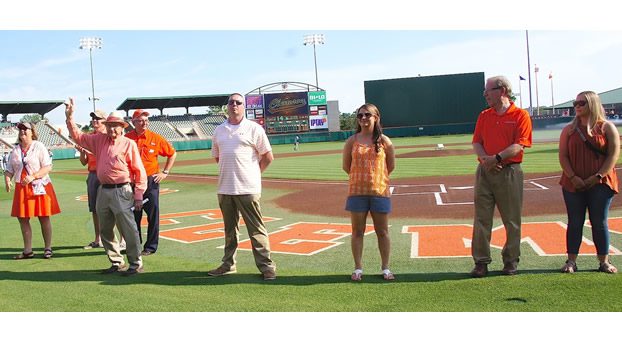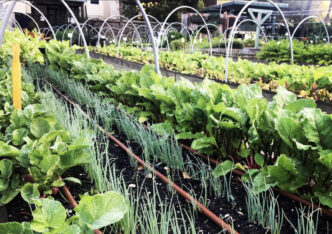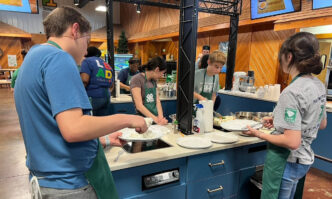CLEMSON — Family reunions are a treasured Southern tradition, but you know you’ve made it big when you’re inducted into the family hall of fame.
[vid origin=”youtube” vid_id=”VCuUEopcEwA” size=”medium” align=”right”]
Four former county agents — members of the Clemson University Cooperative Extension Service family who have delivered research-based information and methods to farmers, homeowners and agribusinesses for more than a century — were honored for lifetimes of service to the people of South Carolina in ceremonies May 17-18.
The four — Libby Hoyle, James Jones, Frank McAlhany and Thomas Tillman — comprise the 2019 class of the Frank Lever County Extension Agent Hall of Fame.
Established five years ago on the 100th anniversary of the Cooperative Extension Service, the hall of fame was created to honor the careers of “longtime, front-line county agents” whose work had an important economic impact on the communities they served.

The program bears the name of U.S. Rep. A. Francis “Frank” Lever of South Carolina, co-author of the Smith-Lever Act of 1914 that created the Extension Service nationally. Lever, a Lexington County native and Clemson trustee, envisioned a national program that would take research-based agricultural and food-science knowledge from colleges and universities and put it in the hands of working people it would benefit.
“The reason this is a great event is that it’s about great people,” said Clemson Extension Service Director Tom Dobbins. “When you travel throughout South Carolina you’ll hear people say, ‘The county agent changed my life’ or ‘The county agent changes my family’s life.’ That was the whole point of Cooperative Extension from the beginning: to bring people the knowledge to change their lives for the better with knowledge they could put to work.”
This year’s inductees are:
Libby Hoyle
If you walk away from the dinner table with no fear of getting sick, you can thank people like Libby Hoyle.
As both a county Extension agent and a food and nutrition specialist, she devoted her career to sharing the science — and practice — of food safety. And she did so with everyone she met. Homemakers? Certainly. 4-H’ers? Of course. How about chefs, waiters, fast-food employees, television viewers, radio listeners … and we’ll run out of space long before we run out people.

Hoyle started this journey in 1973 as a home economist in the Newberry County Extension office after graduation from Limestone College, later earning a master’s degree from Winthrop University. From there, she joined Extension’s Expanded Food and Nutrition Program — EFNEP — in Colleton County before making the transition from rural to urban settings in Lexington County.
With 30 Extension Homemaker clubs in Lexington, she quickly developed skills at “training the trainer,” which would help her reach greater and greater audiences in the future.
“She became known as the foods and food safety expert,” said Betty Baird, former Lexington County Extension director. “I would describe her as the total package. Not only did she present up-to-date nutrition and food safety education, but also she taught those leaders how to teach.”
By 1980, Hoyle had taken a faculty post as a Clemson Extension specialist. The time was ripe to bring Extension food safety training to people who made their livings in kitchens.
“She was teaching schools, fast food restaurants, anyone who worked with food how to serve a safe product,” Baird said.
This food safety training led to an accredited certificate program administered by the National Restaurant Association called ServSafe. “Today, when I go to a restaurant I look to see if they have had the ServSafe training,” Baird said.
“Libby developed and provided many outstanding programs: food competitions, the cooking camp, the breads workshop,” said Pam Ardern, state program leader for 4-H. “The training programs she developed for ServSafe are still being conducted nationwide today.”
Ironically, as Hoyle’s portrait was about to be unveiled for the Lever Hall of Fame, Baird recalled that, as a Lexington County county agent, “Libby worked hard on getting a portrait of Frank Lever hung in the Memorial Building. He was from Lexington,” she said. “She was a true example of what Lever wanted: a way to educate the public with research-based information. She never forgot her roots.”

James Jones
A newly minted graduate of Clemson College in 1961, Jim Jones already knew that agriculture would be his career. An Orangeburg County native, he’d been around it all his life. He raised pigs in his youth. In high school and in college he’d been actively involved in 4-H and FFA.
He had already adopted one of his most important lessons, which he would share with his family and friends: “You can learn a lot about life and something about your faith in watching something grow.”
Jones joined the Clemson Extension Service in Abbeville County, where it didn’t take him long to become a trusted member of the community. Early on he was awarded the Young Man of the Year award by the local chamber of commerce, an organization he would go on to lead. The Abbeville Jaycees gave him a distinguished service award and by 1973 he had received a similar honor from the National Association of County Agricultural agents and been named South Carolina’s County Agent of the Year.
He helped establish Abbeville’s Cattlemen’s Association and farmers’ market as well as Master Gardener and Extension Leadership programs. He coached numerous state champion livestock and poultry judging teams. Under his leadership, 42 youngsters came home state winners in 4-H projects.
“He had two passions: 4-H and cotton. He really knew cotton,” a good thing since Abbeville County boasted about 10,000 acres of cotton at the time, said Carroll Preston Culbertson, himself a Lever Award winner and former county agent in Abbeville and other counties.
“Being a county agent wasn’t just a job to him. It was a mission,” said daughter Susan Costner, who recalled appearing on her dad’s regular Extension radio show when she was just 4 years old.
“He wasn’t just working for a paycheck. He cared deeply for people,” she said. “‘Be ever mindful of the needs of others.’ That’s how we were brought up.”

Frank McAlhany
A native of Branchville, Frank McAlhany grew up on a farm that has been in his family since 1760. He still lives there today.
In a sense, his career in the Extension Service started long before Clemson ever put him on the payroll.
“Our whole family has always appreciated what the Extension Service does,” he told well-wishers at the Lever Award ceremonies. “I guess it goes back to when my grandmother first went up to Rocky Bottom for camp.”
McAlhany himself was active in both 4-H and FFA as a youth. In fact, it was on an FFA trip to Kansas City for dairy judging that he decided he would study dairy science, which led him to a Clemson degree in 1960. From there he embarked on a 31-year career bringing agricultural information to the people of Dorchester and Bamberg counties.
“Frank was a complete county agent,” said Bamberg County farmer Richard Rentz. “He knew about field crops, livestock, dairy, fruit and vegetable horticulture and ornamentals. He could do anything.”
His nomination for the County Agent Hall of Fame received three dozen endorsements from farmers, agricultural industry representatives and his Extension Service colleagues. “These are just the ones that I contacted,” said Phil Perry, himself a member of the Lever Hall of Fame and career county agent. “There could have been many, many more.”
“Frank was both selfless and relentless in making sure that farmers, gardeners, homemakers, 4-H youth and local government officials got the very best answers,” Perry said. “He had the knowledge base, the field experience and the passion to get out there and help people. He blended demonstrations of new technology with field days, tours, yield contests and production meetings to give producers a well-rounded program of up-to-date information.”
McAlhany introduced techniques in dairy artificial insemination, feed and forage testing and ration balancing. He encouraged farmers to use no till and minimum tillage practices to reduce soil erosion. He promoted soil testing, nematode testing, sprayer calibration and subsoiling — all standard practices today, but truly groundbreaking not so long ago.
But he’s quick to remind listeners that no county agent is a one-man band: An entire Extension Service stands behind him. “Clemson always had the best specialists,” he said. “They helped me out any time I needed them.”
He passed along his youthful love of 4-H to his own students. Bob Patrick, now a large animal veterinarian, dairy consultant and equipment dealer, remembers what McAlhany meant to him has a young 4-H member in Dorchester County. Patrick, who is in charge of installing the new robotic milker units at Clemson’s LaMaster Dairy, still has the lamp they built in 4-H Electric Club.

Thomas B. Tillman
When Sumter County agent Thomas Tillman started the Wateree Pest Management Association, it oversaw more than 25,000 acres of cotton.
Sumter County changed a great deal in the more than 30 years that Tillman led its Extension Service, from 1950 to 1981. Cotton acreage declined until the defeat of the boll weevil finally led to a rebound.
While cotton may not exactly be king today, agriculture still thrives, in part because of the work of county agents like Tillman who helped guide farmers and agribusinesses through a lifetime of change.
Tillman assisted in the development of Sumter Dairies, a cooperative that served farmers in Sumter, Lee and Clarendon counties for decades. He led one of the strongest 4-H programs in the state, carrying numerous local livestock judging teams to Chicago to compete nationally.
Tillman’s legacy includes the groundbreaking “Ag Today” program on SCETV, the forerunner of the Emmy Award-winning “Making It Grow,” which today is one of the country’s most popular garden shows.
“It was an honor to succeed Thomas Tillman as the agent in Sumter,” said Rowland Alston, himself a Lever Award-winner and a host of “Making It Grow” for nearly 20 years. “He was one of my mentors and a man I really loved.
“We talk a lot about professional achievements and that’s great. But Extension agents are people who care about other people,” Alston said. “We are all members of the same family and that’s how he treated us.”
An active member of the South Carolina Association of County Agricultural agents, Tillman was a mentor to younger agents all his life. He also was equally active in outreach for Pisgah Baptist Church and the Kiwanis Club, where he helped sponsor Key Club International.
“My granddaddy raised me and I know he would be more than proud of this honor,” said grandson John Tillman. “He was a heckuva man. They don’t make them like that anymore. I can’t tell you how proud I am to carry the last name Tillman.”








